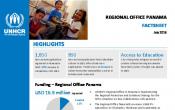Panama Regional Office
The UNHCR's Regional Office in Panama covers operations in Cuba, El Salvador, Guatemala, Honduras and Nicaragua.
Operation: Panama Regional Office
Location
{"longitude":-80,"latitude":8,"zoom_level":0}
Latest update of camps and office locations 21 Nov 2016. By clicking on the icons on the map, additional information is displayed.
Key Figures
| 2018 planning figures | |
| 800 | people of concern in the North of Central America will be provided with material and psychosocial support |
| 300 | households in Panama will receive cash grants |
| 40 | Government personnel in El Salvador, Guatemala and Honduras will be trained in status determination |
| 15 | people will be assisted to departure from Cuba |
| 10 | reception/transit centres in El Salvador, Guatemala and Honduras will be maintained or improved |
| 2016 end-year results | |
| 2,700 | people in transit with international protection needs were assisted in Guatemala |
| 1,960 | refugees and asylum-seekers received legal assistance in Panama |
| 1,400 | IDPs and deportees with protection needs were assisted in Honduras |
| 17 | community-based infrastructure projects in the NTCA countries were supported |
Latest Updates and Related Links
People of Concern
10%
Increase in
2016
2016
| 2016 | 235,707 |
| 2015 | 214,190 |
| 2014 | 19,663 |

[["Refugees",3358],["Refugee-like situation",15000],["Asylum-seekers",4845],["IDPs",174000],["Stateless",3],["Others of concern",38501]]
Loading ...
Panama Regional Office
< Back
2016
{"categories":[2013,2014,2015,2016,2017,2018],"budget":[5.8548486,8.42523081,8.225381364,16.64769407,22.67219369,25.883585876],"expenditure":[4.03032947,4.45055113,4.39118839,9.23860236,null,null]}
{"categories":[2013,2014,2015,2016,2017,2018],"p1":[5.69669732,8.10063207,8.225381364,16.64769407,22.67219369,25.883585876],"p2":[0.15815128,0.32459874,null,null,null,null],"p3":[null,null,null,null,null,null],"p4":[null,null,null,null,null,null]}
{"categories":[2013,2014,2015,2016,2017,2018],"p1":[3.87217783,4.28218306,4.39118839,9.23860236,null,null],"p2":[0.15815164,0.16836807,null,null,null,null],"p3":[null,null,null,null,null,null],"p4":[null,null,null,null,null,null]}
Loading ...
CHOOSE A YEAR
- 2015
- 2016
- 2017
- 2018
Year-end Overview
Plan Overview
Working environment
The Regional Office in Panama ensures the overall coordination of the Regional Protection and Solutions Strategy for the NCA situation. Over the past two years, UNHCR has gradually scaled up National Offices in El Salvador, Honduras and Guatemala. The Regional Office in Panama also has oversight over offices in Costa Rica and Mexico and covers protection activities in Cuba, as well as in Nicaragua where it has no operational presence.
The growing trend of forced displacement from and within the North of Central America (NCA) countries of El Salvador, Guatemala and Honduras increased significantly during 2016, with more than 200,000 refugees and asylum-seekers from the NCA registered in the sub-region at the end of the year, an increase of 68 per cent compared to 2015 and a tenfold increase over the past five years.
While displacement in and from the NCA is multifaceted and has multiple causes, violence and insecurity continues to be a major factor compelling people to move. Traditionally, NCA citizens seek international protection in Canada and the United States of America. However, in the last two years, UNHCR has witnessed a significant increase in the number of asylum-seekers from the NCA in Belize, Costa Rica, Mexico and Panama. Guatemala is also increasingly being perceived by people of concern as a country of asylum, not only of transit. This is expected to continue in 2018.
With the exception of Honduras, data on internal displacement due to violence in the NCA remains fragmented.
The San Pedro Sula Declaration, which launched the regional iteration of the CRRF for Central America and Mexico (known as the Comprehensive Regional Protection and Solutions Framework - CRPSF) was adopted at a high-level regional conference in San Pedro Sula, Honduras, on 26 October 2017.The six participating States (Belize, Costa Rica, Guatemala, Honduras, Mexico and Panama) thereby confirmed their commitment to further consolidate existing regional collaboration by strengthening responsibility-sharing and enhancing protection of asylum-seekers, refugees and IDPs. National and regional efforts are ongoing in order to implement triennial operational plans involving all relevant stakeholders. It is expected that in 2018 the CRPSF will feed into the discussions on the global compact on refugees as a concrete example of regional cooperation and practical implementation of the CRRF.
Key priorities
In 2018, UNHCR will focus on:
- Building strong asylum systems in destination countries;
- Establishing mechanisms that can respond to urgent protection risks faced by IDPs and other persons affected by violence;
- Identifying and protecting deportees with protection needs;
- Finding durable solutions for people of concern, including local integration in destination countries, resettlement through the Protection Transfer Arrangement (PTA) programme, or cooperation with other actors to address root causes that will allow for voluntary return;
- Ensuring safe transit along the main migration routes by establishing protection networks and providing humanitarian assistance, with a special focus on the most vulnerable (women, children, LGBTI people).
Funding shortfalls for the regional protection response could result in greater displacement, increased risks for people of concern who have to flee, and who might be forced to take more insecure routes and become subject of exploitation, SGBV, trafficking, and forced recruitment.






